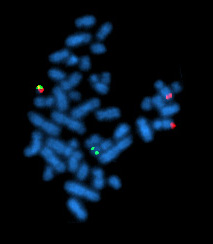Chronic myelogenous leukemia
(Redirected from Chronic myeloid leukemia)
Editor-In-Chief: Prab R Tumpati, MD
Obesity, Sleep & Internal medicine
Founder, WikiMD Wellnesspedia &
W8MD medical weight loss NYC and sleep center NYC
| Chronic myelogenous leukemia | |
|---|---|

| |
| Synonyms | N/A |
| Pronounce | N/A |
| Specialty | N/A |
| Symptoms | Fatigue, weight loss, fever, night sweats, splenomegaly |
| Complications | Blast crisis, anemia, thrombocytopenia |
| Onset | Typically in adulthood |
| Duration | Chronic |
| Types | N/A |
| Causes | Philadelphia chromosome (translocation between chromosome 9 and chromosome 22) |
| Risks | Radiation exposure, age, male gender |
| Diagnosis | Complete blood count, bone marrow biopsy, cytogenetic analysis |
| Differential diagnosis | Chronic lymphocytic leukemia, acute myeloid leukemia, myeloproliferative neoplasms |
| Prevention | N/A |
| Treatment | Tyrosine kinase inhibitors, chemotherapy, stem cell transplant |
| Medication | N/A |
| Prognosis | Generally good with treatment |
| Frequency | 1-2 cases per 100,000 people per year |
| Deaths | N/A |
Chronic myelogenous leukemia (CML), also known as chronic myeloid leukemia, is a type of cancer that originates in the bone marrow and results in the overproduction of white blood cells. It is a form of leukemia, which is a group of cancers that typically begin in the bone marrow and result in high numbers of abnormal white blood cells.
Pathophysiology[edit | edit source]
CML is characterized by the presence of the Philadelphia chromosome, a specific genetic abnormality in chromosome 22 of human cells. This abnormality is a result of a translocation between chromosome 9 and chromosome 22, which creates the BCR-ABL fusion gene. The BCR-ABL gene produces a protein with tyrosine kinase activity that leads to uncontrolled cell division.
Symptoms[edit | edit source]
Common symptoms of CML include:
- Fatigue
- Weight loss
- Night sweats
- Fever
- Splenomegaly (enlarged spleen)
- Hepatomegaly (enlarged liver)
- Bone pain
Diagnosis[edit | edit source]
CML is typically diagnosed through a combination of blood tests, bone marrow biopsy, and cytogenetic analysis. The presence of the Philadelphia chromosome is a key diagnostic marker.
Stages[edit | edit source]
CML progresses through three phases:
- Chronic phase: The disease progresses slowly and patients may have mild symptoms.
- Accelerated phase: The disease progresses more rapidly and symptoms become more severe.
- Blast crisis: The disease behaves like an acute leukemia with rapid progression and severe symptoms.
Treatment[edit | edit source]
Treatment options for CML include:
- Tyrosine kinase inhibitors (TKIs) such as imatinib, dasatinib, and nilotinib.
- Chemotherapy
- Stem cell transplant
- Interferon therapy
Prognosis[edit | edit source]
The prognosis for CML has improved significantly with the advent of tyrosine kinase inhibitors. Many patients achieve long-term remission and have a normal life expectancy.
Epidemiology[edit | edit source]
CML accounts for about 15-20% of all cases of adult leukemia. It is more common in older adults, with the median age at diagnosis being around 65 years.
See also[edit | edit source]
References[edit | edit source]
Search WikiMD
Ad.Tired of being Overweight? Try W8MD's NYC physician weight loss.
Semaglutide (Ozempic / Wegovy and Tirzepatide (Mounjaro / Zepbound) available. Call 718 946 5500.
Advertise on WikiMD
|
WikiMD's Wellness Encyclopedia |
| Let Food Be Thy Medicine Medicine Thy Food - Hippocrates |
Translate this page: - East Asian
中文,
日本,
한국어,
South Asian
हिन्दी,
தமிழ்,
తెలుగు,
Urdu,
ಕನ್ನಡ,
Southeast Asian
Indonesian,
Vietnamese,
Thai,
မြန်မာဘာသာ,
বাংলা
European
español,
Deutsch,
français,
Greek,
português do Brasil,
polski,
română,
русский,
Nederlands,
norsk,
svenska,
suomi,
Italian
Middle Eastern & African
عربى,
Turkish,
Persian,
Hebrew,
Afrikaans,
isiZulu,
Kiswahili,
Other
Bulgarian,
Hungarian,
Czech,
Swedish,
മലയാളം,
मराठी,
ਪੰਜਾਬੀ,
ગુજરાતી,
Portuguese,
Ukrainian
Medical Disclaimer: WikiMD is not a substitute for professional medical advice. The information on WikiMD is provided as an information resource only, may be incorrect, outdated or misleading, and is not to be used or relied on for any diagnostic or treatment purposes. Please consult your health care provider before making any healthcare decisions or for guidance about a specific medical condition. WikiMD expressly disclaims responsibility, and shall have no liability, for any damages, loss, injury, or liability whatsoever suffered as a result of your reliance on the information contained in this site. By visiting this site you agree to the foregoing terms and conditions, which may from time to time be changed or supplemented by WikiMD. If you do not agree to the foregoing terms and conditions, you should not enter or use this site. See full disclaimer.
Credits:Most images are courtesy of Wikimedia commons, and templates, categories Wikipedia, licensed under CC BY SA or similar.
Contributors: Prab R. Tumpati, MD






